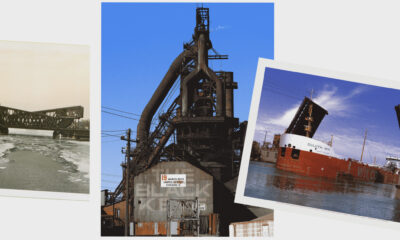Andy MacDougall
Come Together: Beppe Quaglia, Michel Caza, and Gemma Berenguer Talk Pandemic
Published
4 years agoon

I learned something the other day. The word quarantine comes from quarantena, meaning “40 days.” It was used in the 14th to 15th Centuries Venetian language to designate the period all ships were required to be isolated before passengers and crew could go ashore during the Black Death plague epidemic; it replaced the trentino, or 30-day isolation period, first imposed in 1377. Even in the “old days”, they realized dealing with pandemics – and the Black Death was a more intense version of the current situation – required changes as communities, countries and the world dealt with an evolving situation.
As the current pandemic spread around the world, hot spots emerged in northern Italy, with the city of Bergamo being one of the first, and hardest, hit. Beppe Quaglia runs Virus Ink (virusink.com), a leading waterbased ink manufacturer, located there.
In the midst of this crisis, he graciously took time out to answer some questions and share his thoughts with screen printers in other countries.
Italy

Can you give me some idea of how things are in your city?
AdvertisementAs you know, Bergamo has been one of the most involved cities. Fortunately, we have a very efficient health care system and one of the best EU Hospitals, otherwise things could have been even worse. The local drama has been shown on worldwide media, but here the reality was devastating because we add to the images our personal feelings for the losses of our dearest family members who have become sick, and many who have died. Things are going better now and we are seeing consistent improvements even though the deeper wounds will take longer to heal.
Because not all the regions have been affected with same impact, it is very difficult for the government to set up a unique regulation for all. This is going to create some conflicts between the Central Government and the Regions. But this is good because it tends to make the restrictions more effective and in balance with the local realities. People are taking things very seriously and the local authorities are working hard to plan a proper restart. For once, we are really appreciating the efficiency of our administration system.
Are you still in lock down?
We never locked down at work because we supply “essential” producers, but most of our clients still are. At work, we divided the team into smaller groups working in different times and this has allowed us to stay open and work safely. We are thinking to change our organization into many smaller, self-sufficient working entities, and when the business returns to “normal,” we are also thinking to extend the segmentation to the production plant creating micro-production areas. This will allow us to keep our people safe, but also to be more flexible and create a better way in the future to receive orders. This will also allow us to be ready for possible future situations, because (alas) it’s my opinion that we need to learn how to exist and function with other possible Coronavirus outbreaks.
Does it feel like things are improving?
The government has set up a plan to restart, but it’s still very restrictive and limited to the production plants having effective safety conditions. Not yet for retail shops, restaurants, bars, etc. Buses, trains, metros, will not allow more than 20 people for each wagon, companies have to assure distancing with more shifts and differentiating the hours. Professional sports remain in lockdown and physical activities are allowed only locally and limited to the residents.
AdvertisementWhat about screen printing companies?
Most of the printing shops are still in lock down and all of them are planning to jump into face-mask production. This is good to keep hope alive, but despite the huge demand, I do not believe this will be a stable future for screen printing. For a matter of productivity and costs containment, most of face mask productions will end in the hands of the big manufacturers and the decoration will be done online. This is because the Italian government fixed the selling price of the face masks at 0,50 euro, so not much margin for a print shop. Many of those printers who have converted their production to masks are addressing their efforts to make unique “fashion masks”, but for how long will this be viable?
In this panorama, some positive things are happening as well. I’m seeing an improved interconnection among the printers, with video discussion use growing where printers share and brainstorm about the common issues. Also the video interviews where experts from different industry segments are solicited to express and share their vision. This is great because everybody has a chance to see their reality from a different point of view. Another good thing is that many marketing experts are now planning to cooperate in building a task force in favor of the printing community. Just a few weeks ago, this was almost impossible to do in Italy due to our propensity to work on our own!
The screen printing world needs timely solutions, because we are not talking about nuts and bolts; our companies are living entities, and therefore, “perishable.” Recovery that is too long can collapse the production chains we are part of, because they are composed of companies of different sizes, cultures, and with different economic and financial strengths.
When the worst is over, the real question will not be, “how many of us are still able to start again?” but “what kind of market is it going to be?” The shock we are experiencing creates great uncertainty for the future, which is something dramatic for the western mentality accustomed to keeping everything under control. To be ready, we must try to understand where this emergency will take us.
Certainly we mustn’t stand still, waiting for political decisions from outside. We have to act in advance, basing decisions on our own common sense, past achievements, and intuition. We are facing a change that has been forced on us, but perhaps it was necessary to convince all of us to change our approach in business, learning to produce in a sustainable way, and avoiding the creation of poverty. To do that, we will need renewed courage to continue despite everything; to have full confidence in what to do; to believe in our own philosophy; and work to keep our image and credibility high. Luck is not enough!
AdvertisementFrance

Meanwhile in France, our grandaddy Michel Caza continues to help the legions of screen printers worldwide in all areas of production: textile, industrial, and graphic. If you don’t know Michel, he is a true pioneer of our profession gathering skills and literally inventing processes as he printed finer and finer detail and embraced new technologies, moving from hand cut stencils through UV and digital processing. Although commercial, his work always displayed an emphasis on fine art “serigraphy.” In his Facebook Group, called Screen Printing and Fine Art – the friends of Michel Caza, he runs through the step-by-step production notes of groundbreaking prints by famous artists featured in his recent autobiography “Michel Caza: The Chameleon of Contemporary Art.” Along the way he helped start FESPA, was its president, still serves on the board, still does consulting, and picked up something like 350 awards for his printing, including the Parmalee award from SGIA.
How are things in France?
In terms of health, the situation is gradually improving. Yesterday evening, we learned that we will come out of confinement on May 11 (it is total here, we only go out for urgent shopping: food and health), with masks for everyone. The schools will also gradually restart from May 11. But hotels, restaurants, cinemas, cultural events will remain closed. Borders remain closed too, for all non-European citizens. We have more than 25,000 dead and nearly 175,000 cases.
What is the government doing to assist business and workers?
On the social level, the government spends billions, without limits, to help companies by paying laid off workers at 84 percent of their salary. Eight million employees benefit from it. No more payroll taxes either, for companies or employees. Very small businesses and the self-employed are also helped with $1600 to $2200 payments (800,000 businesses benefit from this) and there are bank loans at 0 percent with state guarantees. The aim is to avoid layoffs and to facilitate resumption of the economy when it takes place.
How is business in general?
On the economic level we expect a fall of 7 to 10 percent of the GNP for the year 2020, the most serious recession since 1945. At the moment, 80 percent of companies are shut down; many should gradually start producing again, provided that their employees are protected.
What about in “our” business, screen and graphic production?
Many screen printers, digital printers, and P-O-S specialists are finishing current orders and have no new orders at the moment. Some make masks, others make “distance” markings on the floor, and others make transparent panels for store cashiers.
Our association created a permanent “Forum FESPA France” and gives a lot of advice:
– Take the time to call, retain customers, partners.
– Contact your bank, approach for loans with state guarantees.
– Procedures for applying for partial unemployment.
– Take advantage of this situation to invest in new machines or training among others while the
rates are attractive before the recovery.
– Despite the situation try to have a positive attitude.
– Turn this crisis into an opportunity to rethink your business differently.
Our board meets regularly and we communicate with our members by video conference.
As for me, I continue to animate my Facebook group Screen Printing and Fine Art – the friends of Michel Caza (readers are welcome to join and participate, it’s fascinating!) to help both technically and “aesthetically,” and to bring some ideas, like that of printing the masks, to advertise.
Spain

Our last correspondent is a friend who runs a small boutique screen printing shop called Monostereo (monostereo.cat) on a side street in the Sants neighborhood in Barcelona, Spain. Gemma Berenguer has a background in design and screen printing and a zest for life and art and music and printmaking that is, in a word “infectious.” When not printing posters for touring bands, or shirts, or art prints, she is busy traveling Europe and North Africa conducting workshops and demonstrations of screen printing. I asked her about “Best of Times, Worst of Times” and she gave us these thoughts:
Paradox is and always has been everywhere, even inside us. A total lockdown started March 14 here in Spain. Since that day, I’ve witnessed both the best and the worst versions of human beings. From amazing individual and neighborhood community actions, to policemen kicking out homeless people from an ATM saying “you must stay at home” to someone who doesn’t have one.
I’m optimistic by nature, so my first thought was, despite the terrible situation we’re living in, and possibly worse to come, I could use all this free time to do all those things I never find the time to do. (A common theme of many in many of the reports from different countries!) At first I was even excited about it, until the moment I realized it won’t be that easy. So selfish and such naive thinking. I was paralyzed, overwhelmed, and unable to work at a normal pace. I even got angry with myself the first days: “Why can’t I focus or be productive now that I have all this time?”
Empathy can make us feel both great and terrible sometimes, but we definitely wouldn’t be humans if we didn’t have empathy. And here’s that paradox again…
Since you wrote that, I know you have been busy printing, and currently you are redoing your web store to create online sales, as the opportunity to sell at festivals, the main source of income for gig poster printers, is gone for the duration. Anything else happening?
A good thing here, maybe the best in my opinion, is that Barcelona’s air pollution levels hasn’t been this low since 1920. That is 100 years ago. A paradox again: While humans are dying, the planet is healing. The sky is so clean and sharp it seems my eyes got an upgrade to HD vision. The air is so pure it almost hurts when you breathe.
I´ve heard a lot of times that humans have no historical memory. As the Spanish saying goes, “Humans are the only animals that trip over the same stone twice.” Hopefully this time we’ll get the message the world is trying to send, and we get it right. And not forget, again.
Thanks Beppe, Michel, and Gemma, for taking the time to share your thoughts and give us insight into how things are in other countries. Readers, if this is your first look, please see Part 1 of “Come Together,” the original column from the April/May issue of Screen Printing magazine, Part 2 Nick Danger in China, and Part 3 with Edward Cook at ECIscreenprint in the USA.
Don’t forget to bookmark screenweb/com/shoptalk. In the coming days, we will hear from Ahmed Bautista in Mexico City, Iris Sautier in Montreal, Luther Davis in Brooklyn, and Tom Davenport in California.
In the meantime, stay safe, stay healthy, stay kind, and keep your squeegees sharp. We are screen printers. We innovate. We solve problems. We will get through this.
Other Articles in the “Come Together” Series
Come Together (original online article)
- Come Together: A Series
- Come Together: Beppe Quaglia, Michel Caza, and Gemma Berenguer Talk Pandemic
- Come Together: 'Nick Danger' Shares His Experience Facing the Pandemic in China
- Come Together: Ahmed Bautista Discusses the Pandemic's Impact on Mexico
- Come Together: Iris Sautier, Luther Davis, and Tom Davenport Share Their Pandemic Strategies
- Come Together: Edward Cook on Managing Through COVID-19
- New Normal: Updates From The ‘Come Together’ COVID-19 Series
SPONSORED VIDEO
Let’s Talk About It
Creating a More Diverse and Inclusive Screen Printing Industry
LET’S TALK About It: Part 3 discusses how four screen printers have employed people with disabilities, why you should consider doing the same, the resources that are available, and more. Watch the live webinar, held August 16, moderated by Adrienne Palmer, editor-in-chief, Screen Printing magazine, with panelists Ali Banholzer, Amber Massey, Ryan Moor, and Jed Seifert. The multi-part series is hosted exclusively by ROQ.US and U.N.I.T.E Together. Let’s Talk About It: Part 1 focused on Black, female screen printers and can be watched here; Part 2 focused on the LGBTQ+ community and can be watched here.
You may like
Advertisement

Arcus Printers Barracuda Conveyor Flatbed Cutter

The Profit Impact of a Market Dominating Position

Inkcups Announces New CEO and Leadership Restructure
Advertisement
Subscribe

Bulletins
Get the most important news and business ideas from Screen Printing magazine's news bulletin.
Advertisement

















